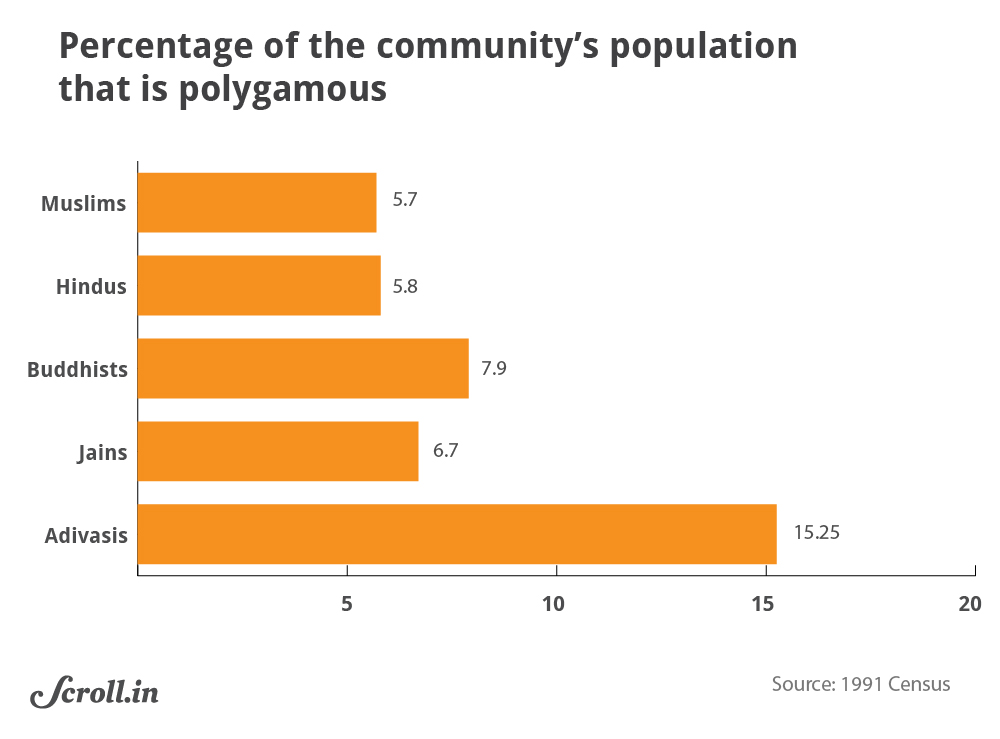Ahmedabad
(Head Office)Address : 506, 3rd EYE THREE (III), Opp. Induben Khakhrawala, Girish Cold Drink Cross Road, CG Road, Navrangpura, Ahmedabad, 380009.
Mobile : 8469231587 / 9586028957
Telephone : 079-40098991
E-mail: dics.upsc@gmail.com

Polygamy in India
News: Himanta Biswa Sarma, the CM of Assam recently said that the state government will move to ban the practice of Polygamy through “Legislative Action”, and that an “Expert committee” would be formed to examine the issue.
What is polygamy?
It refers to the custom or condition of being married to more than one person at the same time.
The National Family Health Survey-5 (2019- 20) showed the prevalence of polygamy was 2.1% among Christians, 1.9% among Muslims, 1.3% among Hindus, and 1.6% among other religious groups.
What do the laws of different religions say?
| Religion | What do religions say? |
| Hindus | According to Hindu marriage act, 1955 Hindu polygamy would be abolished and criminalized. Under Section 11 Act, which states that polygamous marriages are void, the Act cautiously mandates monogamous relationships. Because Buddhists, Jains, and Sikhs are all considered Hindus and do not have their own laws, the provisions in the Hindu Marriage Act apply to these three religious denominations as well |
| Muslims | The clauses under the ‘Muslim Personal Law Application Act (Shariat) of 1937, as construed by the All India Muslim Personal Law Board, apply to Muslims in India. Polygamy is not prohibited in Muslim legislation because it is recognised as a religious practice, hence they tend to preserve and practice it. It is, nevertheless, clear that if this method is determined to violate the constitution’s basic rights, it can be overturned. When there is a disagreement between the Indian Penal Code and personal laws, the personal laws are implemented since it is a legal principle that a specific law supersedes the general law |
| Parsis | The Parsi Marriage and Divorce Act, 1936, had already outlawed bigamy. |
Important SC observations on Polygamy:
Parayankandiyal v. K. Devi & Others (1996) - The Supreme Court (SC) concluded that monogamous relationships were the standard and ideology of Hindu society, which scorned and condemned a second marriage. Polygamy was not allowed to become a part of Hindu culture due to the influence of religion.
Javed & Others v. State of Haryana & Others (2003) – The SC stated that Article 25 freedom is subjected to social harmony, dignity, and wellness. While Muslim law allows for the marriage of four women, but it is not compulsory and it will not be violating any religious practice to not marry four women.
Impact of Polygamy in India:
India is a secular state, where no religion is considered superior or subordinate to another, and each religion is treated equally under the law.
Article 13 of the Constitution specifies that any law that contravenes Part III of the Constitution is invalid.
Article 14 of the Constitution guarantees equal treatment and protection under the law to every individual within the territory of India.
The state is prohibited from discriminating against any person based on their religion, ethnicity, gender, or place of birth, according to Article 15(1) of the Constitution.

Address : 506, 3rd EYE THREE (III), Opp. Induben Khakhrawala, Girish Cold Drink Cross Road, CG Road, Navrangpura, Ahmedabad, 380009.
Mobile : 8469231587 / 9586028957
Telephone : 079-40098991
E-mail: dics.upsc@gmail.com
Address: A-306, The Landmark, Urjanagar-1, Opp. Spicy Street, Kudasan – Por Road, Kudasan, Gandhinagar – 382421
Mobile : 9723832444 / 9723932444
E-mail: dics.gnagar@gmail.com
Address: 2nd Floor, 9 Shivali Society, L&T Circle, opp. Ratri Bazar, Karelibaugh, Vadodara, 390018
Mobile : 9725692037 / 9725692054
E-mail: dics.vadodara@gmail.com
Address: 403, Raj Victoria, Opp. Pal Walkway, Near Galaxy Circle, Pal, Surat-394510
Mobile : 8401031583 / 8401031587
E-mail: dics.surat@gmail.com
Address: 303,305 K 158 Complex Above Magson, Sindhubhavan Road Ahmedabad-380059
Mobile : 9974751177 / 8469231587
E-mail: dicssbr@gmail.com
Address: 57/17, 2nd Floor, Old Rajinder Nagar Market, Bada Bazaar Marg, Delhi-60
Mobile : 9104830862 / 9104830865
E-mail: dics.newdelhi@gmail.com